 When Connie retired from her corporate job at the age of 48, she founded a nonprofit aimed at transforming the lives of Afghan women and their families through the sale of exquisite hand-woven rugs and bracelets.
When Connie retired from her corporate job at the age of 48, she founded a nonprofit aimed at transforming the lives of Afghan women and their families through the sale of exquisite hand-woven rugs and bracelets.
Tell us a little about your background…
I am 60 and live with my husband, Tom, in Lake Forest, Illinois. We have four children, ranging in ages from 19 to 25 and in college or working. I grew up primarily in Texas, received my undergraduate degree from University of Texas at Austin and my MBA from The Wharton School, University of Pennsylvania.
I spent 20 years at Goldman Sachs, rising through the ranks to be named the first woman partner in Sales and Trading in the firm’s history. I worked for the firm in Los Angeles, Chicago, and New York before I retired in 2001.
What prompted your retirement?
I thought about retiring from Goldman Sachs for about two years before actually doing so. I had set a goal that when my oldest was ten, I would alter my work pattern. I hit that goal pretty closely—he was 11 when I retired, at the end of 2001.
I was in New York City on 9/11, which simply confirmed my decision to start a new phase of life. I flew into New York City at about 5pm on Monday, September 10th for meetings on Tuesday. Thankfully, my breakfast meeting was in midtown. After the first plane hit, someone in our meeting got a call to say there’d been an accident. Naturally, we thought it was a small plane. We decided to wrap up the meeting since we knew the traffic would be terrible getting downtown. It wasn’t until we got to the lobby of the building—at this point the second plane had hit—that we understood this was something quite different.
It took me until Thursday to be able to leave Manhattan when the bridges re-opened. All I wanted to do was to get back home to my family. It was probably six months before I returned to NYC again.
When you left your full time career, what did you do next?
As a partner at Goldman Sachs, any time I was not at work, I spent with my children; but the scale was tipped heavily to work, as my career required. With my next phase, I consciously wanted to “rebalance my portfolio of time” to 1/3 business, 1/3 non-profit/philanthropy, 1/3 family (and with a bit of “me” time).
During the first two years, the business portion consisted of angel investing in women-led businesses with a group of women in Boston. Angel money is typically the first raised to help a small business get started, after the entrepreneur has put as much money of his or her own into the business. While we had plenty of losers, our big winner was Zipcar. I also joined my first corporate board as a director.
For non-profit work, I chaired The Committee of 200, the organization of leading women entrepreneurs and corporate executives. This took up about two days a week and was a volunteer position with a paid staff of eight and about 500 members. I had begun serving on the board of NorthShore University HealthSystem before leaving Goldman Sachs and continued to do so. I later became its first and only (to date) woman Chairman of the Board.
Importantly, as it relates to my primary next act, I was asked to join a bi-partisan State Department Commission established by Presidents Bush and Karzai, called the U.S.-Afghan Women’s Council. The goal of this group was to help ensure that women had a seat at the table following the fall of the Taliban. As a delegation, we traveled to Kabul for the first time in January 2003 to see the condition of women there. This trip was a seminal moment for me.
Interestingly, the U.S.-Afghan Women’s Council is now housed at Georgetown University and has grown to about 75 members focusing on many areas like business, education, healthcare, civil society, and philanthropy. True to its bi-partisan roots, its Honorary Co-Chairs today are Laura Bush, Hillary Clinton, and First Lady of Afghanistan Rula Ghani.
What is your next act?
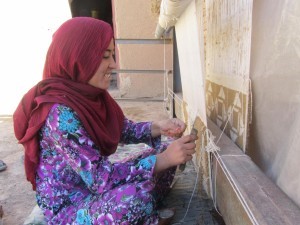 In 2003, at the age of 49, I founded ARZU, a non-profit corporation, with the aim to create jobs for Afghan women, so they can lift themselves and their families out of poverty. ARZU, or “hope,” transforms lives through ethical, artisan-based employment, education, and access to healthcare, thereby changing the way they see the world and their place in it.
In 2003, at the age of 49, I founded ARZU, a non-profit corporation, with the aim to create jobs for Afghan women, so they can lift themselves and their families out of poverty. ARZU, or “hope,” transforms lives through ethical, artisan-based employment, education, and access to healthcare, thereby changing the way they see the world and their place in it.
Through the sale of Afghan-made rugs and Peace Cord® bracelets, ARZU STUDIO HOPE supports a holistic approach to sustainable poverty alleviation through artisan-based employment that empowers Afghan women. Women, earning fair labor wages, weave exquisite hand-knotted rugs and paracord bracelets. Innovative social benefit practices drive transformational change by providing grassroots access to vital education, healthcare, clean water and sustainable community development programs.
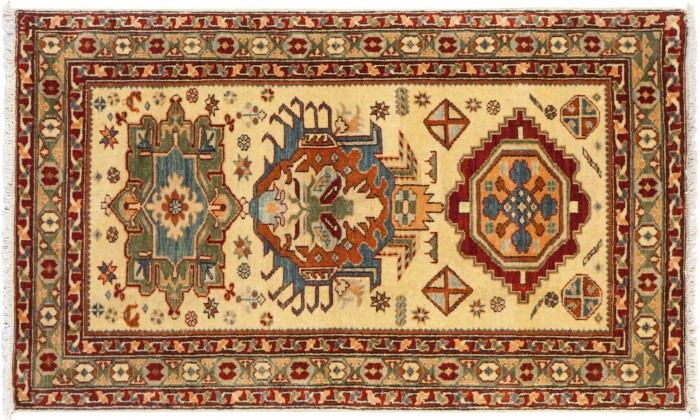
ARZU rug from Splendor collection
Tell us about some of the women ARZU helps…
There is a wonderful Native American proverb, “Tell me a fact and I’ll learn. Tell me a truth and I’ll believe. But, tell me a story and it will live in my heart forever.” Each ARZU weaver and her family members have endured more suffering than anyone living here could fathom. We learn their stories and share them with the buyers of the rugs they weave. Here are two such stories:
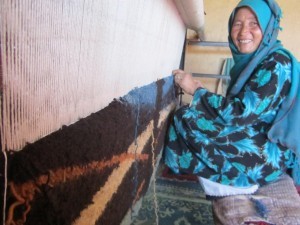
Zahra
First, meet Zahra a 45 year-old mother of eight—five daughters and three sons. Pre-Taliban, Zahra and her family lived comfortably on their small farm, feeding themselves from their abundant produce and livestock. This life was destroyed when the Taliban burned the farm and the family was forced to flee to Pakistan as refugees.
After eight years of struggle and hardship in the refugee camp, the family returned to a life that no longer existed. The once lush land of Bamyan Province was now barren and her husband could not find any farm work. Zahra, a skilled weaver, got work with a random rug producer where she was paid last at the end of a highly exploitative supply chain.
In Zahra’s words: “No one can understand the pain of seeing your child starve and know that there is nothing to feed him. Rug weaving is a family tradition and I am very good at it. But even when I wove big carpets, the money I was paid was mere pennies.”
In 2006, Zahra learned about ARZU and has since been able to reclaim her life, her home, and her sense of self-worth: “ARZU came to our village and I have been working for them ever since. Finally, there is hope for my family. With my own money, we built a three-room home and even have a TV, satellite dish and computer. I am now literate and my children attend Government Schools. My youngest child attends the ARZU preschool. I send both my oldest daughter and son to the University. ARZU is the window of hope for my family and me.”
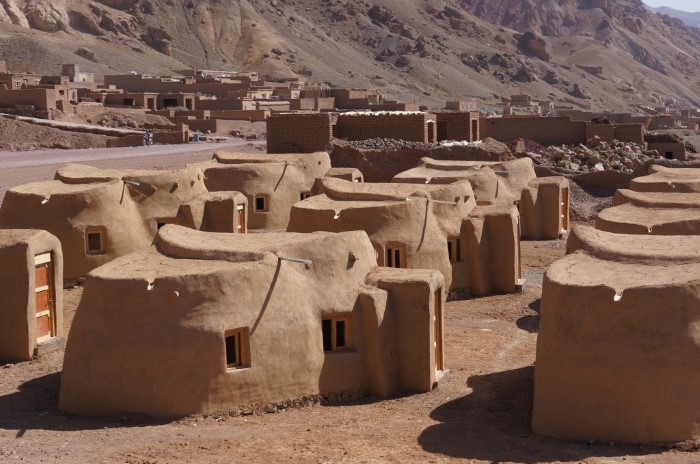
ARZU works on community development – Superadobe homes in Afghanistan
Closer to our own children’s ages, there is Masuma, an 18-year old girl from Dragon Valley, Bamyan. In the late 1990s, after the Taliban murdered her father, she, along with her mother, grandmother, and six siblings fled from their home in Bamyan to Kabul before escaping to a refugee camp in Pakistan. The family finally returned home in October 2007, which was when Masuma’s mother and grandmother joined ARZU’s weaving program. Although Masuma was of age to enroll in the local Government School, she was so far behind her peers that she was denied enrollment. Thanks to ARZU’s fast track education program, Masuma and her siblings were able to catch up and be mainstreamed.
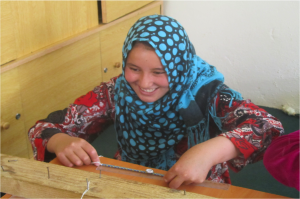
Masuma
Masuma says, “When I learned that I could not go to school, I was heartbroken.I thought I would never be anything but a burden to my family. I feared that my mother would force me to get married as soon as I was of age. Thank God for ARZU. ARZU is still here and still helping my family and me. I am now enrolled in ARZU’s English classes. With education, I do not need to be blinded in life.”
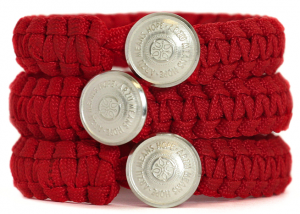 Last year, Masuma started weaving Peace Cord® bracelets as a part-time job. She is very proud that she can help her mother with daily expenses and the cost education of her siblings: “As a wage earner, I am a contributor, rather than burden to my family. When a person works and earns her own income, it automatically gives her a power in family. I have this power now.”
Last year, Masuma started weaving Peace Cord® bracelets as a part-time job. She is very proud that she can help her mother with daily expenses and the cost education of her siblings: “As a wage earner, I am a contributor, rather than burden to my family. When a person works and earns her own income, it automatically gives her a power in family. I have this power now.”
Watch this short video, “Future Valedictorians,” on the preschools ARZU has opened in Afghanistan.
Watch this short video about ARZU on Al Jazeera.
How did you go about launching ARZU?
I found the challenge of helping women in Afghanistan so compelling that I jumped in without really knowing anything about Afghanistan, traditional international development practices, Islam, or the product that we ultimately ended up creating—high-end, ethically-made, hand-knotted rugs. I simply started and made it up as we went along, based on what I perceived was common sense and a core set of basic principles, starting with: It’s not about us, it’s about empowering Afghan women.
I obtained seed funding from USAID (U.S. Agency for International Development) and started by employing 30 Afghan weavers, one U.S. employee and one Afghan employee. Today, ARZU employs some 500 Afghans, including an all-Afghan management team of 55, and has three full-time and two part-time paid U.S. team members, plus me. I serve pro bono as Chairman and CEO.
I created ARZU from the outset to be an innovative model of social entrepreneurship that would be sustainable (self-funding) through rugs sales, rather than wholly dependent on a charity/donation model. Back in 2003, social business was not the established premise that it is today.
ARZU has become my single largest commitment of both time and financial resources, although I still serve on corporate and nonprofit boards as well.
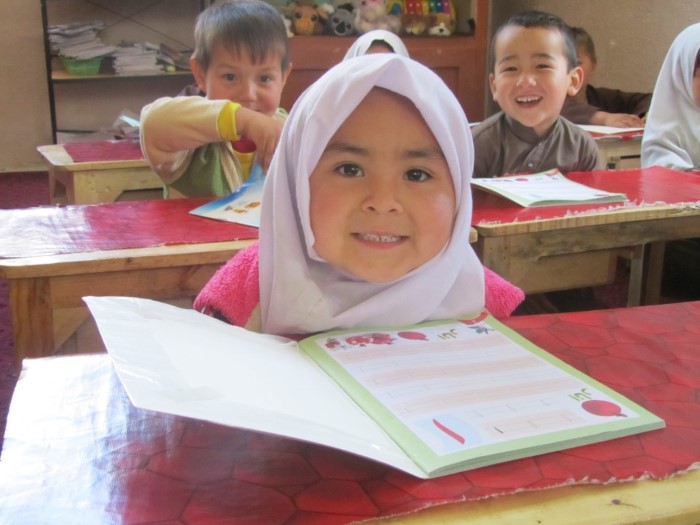
ARZU works on education – Preschool girl
How supportive were your family and friends?
My husband and kids have been my chief cheerleaders from the get-go. They wear Peace Cord® bracelets, have ARZU rugs in their apartments, and can run through the ARZU story by heart. One of my sons (now an engineering major in college) has served as ARZU’s IT Department for the entire team, since he was about 11. He’s updating a computer for the Chief Operating Officer now. My husband offers wise counsel, moral support, and a shoulder to cry on.
My friends were the first to put their hands up to participate on ARZU’s Advisory Board or to serve as ARZU Ambassadors, spreading the story and leveraging their own networks in so many helpful ways. It never ceases to amaze me who knows whom—one may have a sister-in-law in media, someone else’s husband might recommend me as a conference speaker, a third person’s decorator now is an ARZU convert. ARZU has really been built through the help of hundreds of volunteers, contributing in a myriad of large and small ways. ARZU has very little marketing budget, so we grow organically by word of mouth. Basically, if you know me, or one of my friends, you probably own at least one ARZU rug!
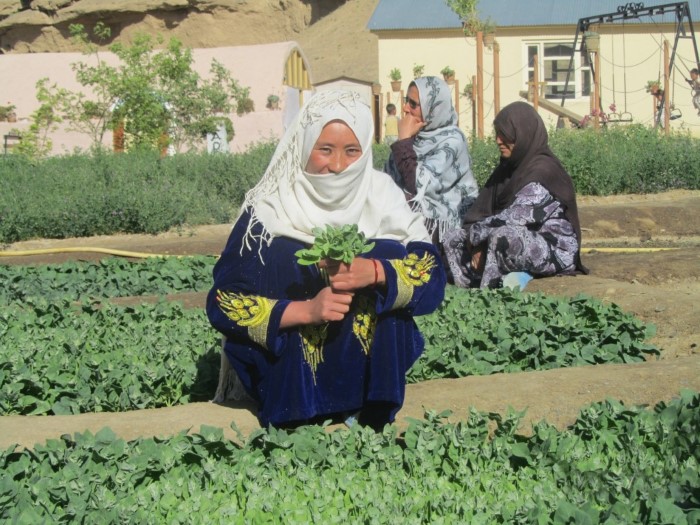
The women tend garden plots as part of ARZU’s community development
How did you recruit your US team?
The very first ARZU employee, my right-hand person for the first six years, started as a volunteer. She had returned to Lake Forest after law school and wanted something interesting to do while studying for the bar. She ended up joining ARZU and stayed until she got married and started a family. She brought in our second U.S. employee who’s been with ARZU for ten years, even after the birth of two children.
Most of our U.S. employees have come to us through personal recommendations or after volunteering. The size of our staff has varied over time. We’ve become leaner and fitter on the U.S. side as the number, tenure, and training of our Afghan team has grown. Given their long tenure and deep commitment to ARZU’s mission, Melissa Bertenthal, COO, Angela Attento, Creative Director/VP Production, Suzi Rizzo, VP Sales/ Business Development, along with Hamid Hekmat, Country Director-Afghanistan, are the backbone of our organization and each critical to our success.
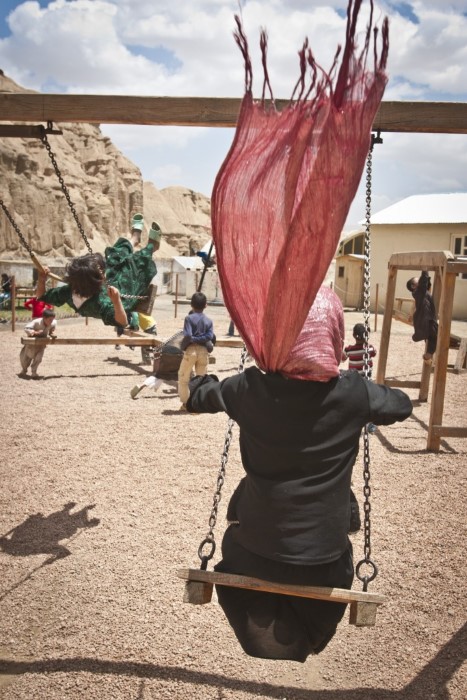
Arzu Studio Hope playground in Dragon Valley, west of the town of Bamyan
What challenges did you encounter? What keeps you going?
Name a challenge and we’ve had it. At least once a year for the past 12 years, I’ve encountered some problem that seemed insurmountable and I’ve thought about giving up.
There were big issues like: Would we ever find a true export product that could be made in Afghanistan by women? How would we identify and train an Afghan staff on the other side of the world? Could we get consistent product quality? What social programs were critical for women who were illiterate, malnourished, and house bound by culture? How do you deal with security issues in a war zone?
And there were—and still are—a myriad of day-to-day execution challenges like: How do you wire money for payroll into a country with no Central Bank? How do you ship goods in absence of commercial shipping infrastructure? What do you do when DHL gets blown up with your new samples inside?
It took us five years simply to build our footprint and to develop a distributed (home-based) manufacturing system that could consistently produce goods to international quality standards. Now, ARZU has won several international awards for product quality/design, innovative business practices and social transformation through an eco-system of education, basic healthcare, and community development programs.
It is the strength of the Afghan women themselves that keeps me going. They have no other option but to get up every day and put one foot in front of the other. When I feel like giving up, I simply read some of their stories to realize that I cannot walk away.
This is a country with 35 years of suffering from non-stop war and essentially still no infrastructure. Afghanistan has been ranked by the Thompson-Reuters Foundation as the “world’s worst place to be a woman.” It is arguably the hardest place in the world to try to operate a business.
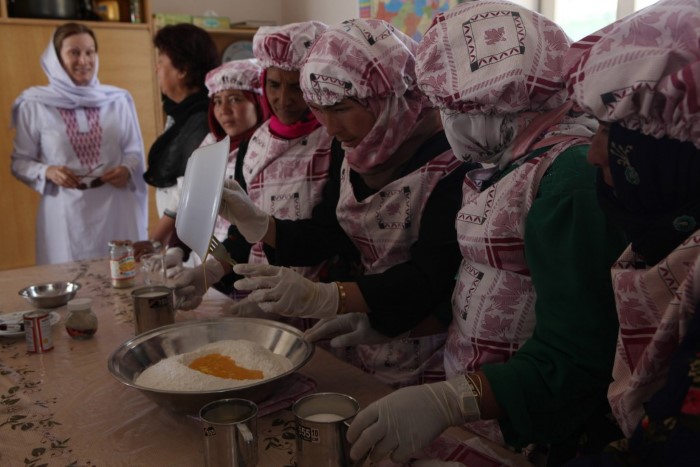
Connie watches as Afghan women attend a baking class at the Bamyan Women’s Community Center, developed and managed by ARZU
How do you raise money for ARZU?
ARZU began ground operations in June 2004 and we are striving to become 100% self-funding through rug sales. Our annual deficit has been funded through grants/donations from wonderful supporters who have heard of our work and through volunteer resources.
ARZU’s objective since the beginning has been to prove that the sales revenue from true export-quality, ethically-made rugs would be sufficient to self-fund all of ARZU’s operations—not just the production expenses, but all the social benefits and community programs as well. This is an ambitious goal and there is certainly no other NGO in Afghanistan that is even close to attempting this approach. The point is not to be solely reliant on charitable donations. The problem with a charity model is that, when the funding stops, as it always will at some point, the programs stop as well.
As a result, ARZU has never had a development or fundraising staff position. This has probably been my biggest mistake. I underestimated the amount of time and the complexity of getting what seemed to be a straightforward business off the ground in Afghanistan. As a result of not fundraising in a comprehensive way from the outset, ARZU has been under-capitalized. On the one hand, as with any start-up business, being “lean” leads to creative, bootstrapped solutions, since throwing money at a problem has never been an option. On the other hand, growth has been slower than it otherwise might have been.
ARZU is a 501(c) 3 non-profit, so all donations or grants are tax-deductible. Rug sales now cover about 70% of our total budget, which means we rely on charitable donations or grants for the other 30%. We still have no fundraising position, so, once again, when people hear about ARZU through word of mouth, we hope they are sufficiently inspired to write a check or buy a rug.
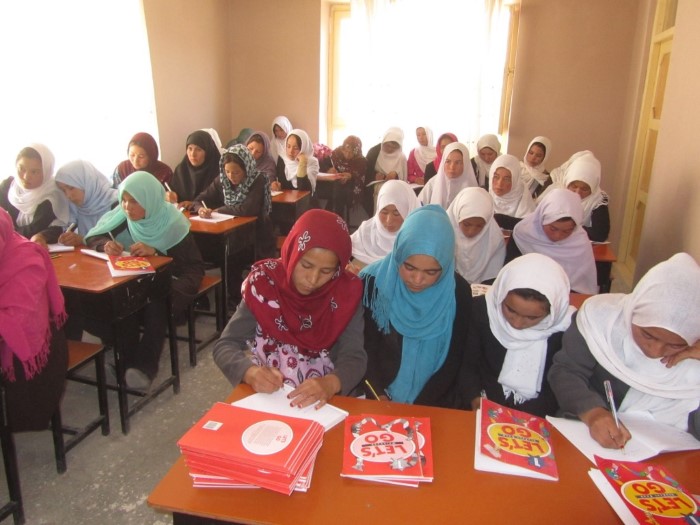
How do you promote the work of ARZU?
Our growth is based on word of mouth among conscious consumers—those who are intentional about buying ethical products with purpose at competitive pricing. After trafficking, the rug industry is one of the most exploitative in the world of women and children.
Since we have no advertising budget, we strive for credible editorial press—magazines, newspapers, television, and social media. I speak frequently to audiences of all kinds—schools and universities, women’s groups, conferences and, increasingly, corporations, on leadership and the role of business as a force for good in the world. As the ARZU story has become more widely known, I now receive speaking fees, which I accept in the form of an honorarium paid to ARZU as a charitable donation.
You also forged a collaboration with renowned architects. How did this come about?
Three years ago, we reached out to six iconic architects—starting with Stanley Tigerman and Margaret McCurry here in Chicago, who each agreed to design and gift new modern patterns in support of ARZU’s mission. This set of patterns became known as the “Masters’ Collection” and includes Frank Gehry, Michael Graves (who sadly passed away a few months ago), Zaha Hadid, and Robert A.M. Stern.
Thanks to a corporate partnership with Steelcase, its New York-based PR firm promoted this unique collaboration, which garnered some 60 press stories and elevated ARZU’s brand and credibility in the marketplace.
Through the Skoll Foundation, which invested in ARZU as a leading social enterprise in 2008, I was introduced to Patrick Creedon. Patrick, originally from Chicago, lives and works in LA and, since 2006, is one of only a handful of filmmakers to have multiple releases ranked in the top 100 highest-grossing documentaries. After hearing the ARZU story and about the Masters’ Collection, Patrick volunteered to create, film, and edit a “one-minute mini documentary” based around an interview with Frank Gehry. This is another example of professional volunteerism and generosity—the architect and the filmmaker devoting their scarcest resource, their valuable time—to further ARZU’s mission.
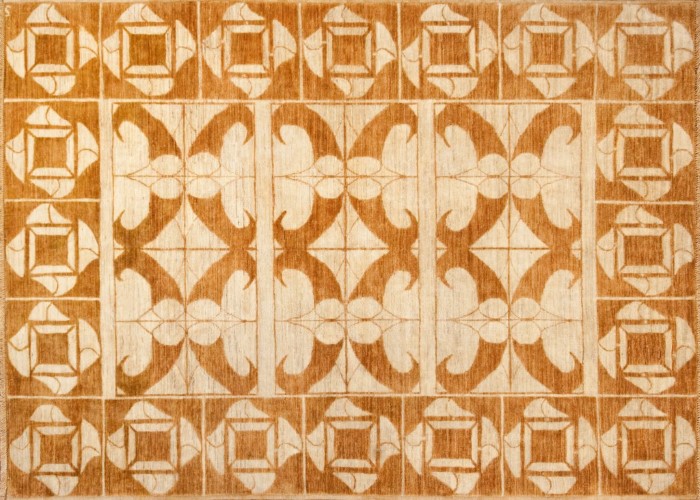
ARZU rug designed by Stanley Tigerman
How often do you go to Afghanistan?
I’ve been to Afghanistan four times—2003, 2004, and 2005 with the State Department as a member of the U.S.-Afghan Women’s Council and most recently during the surge in 2010 with the U.S. Marines. Much of my time on the ground was tightly scheduled around the delegations, with brief chances to step away to spend time with the ARZU team there. The best trip ever was bringing a couple of Marine officers to Bamyan Province for a few days to show them our operations and to have them meet our wonderful ARZU team. They were amazed by what ARZU has been able to accomplish there and excited to see Afghans so competently running the business from A to Z.
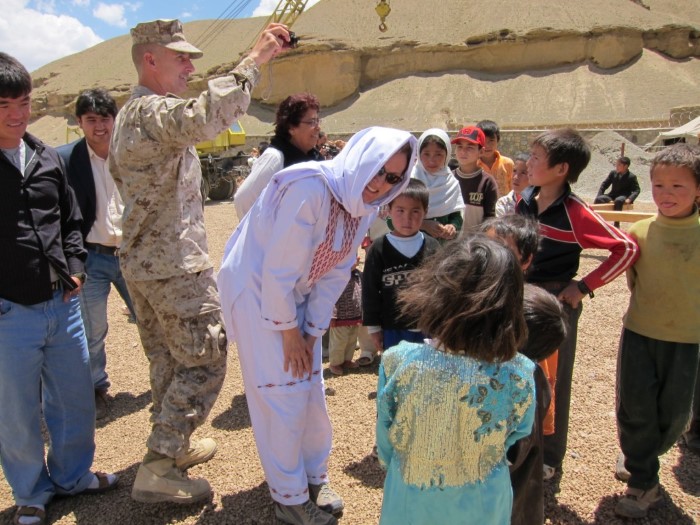
Connie visiting with children at an ARZU playground, June 2010
What advice do you have for women seeking reinvention in midlife? What have your learned?
There are times in life when your heart and/or head tell you make a change. These times of transition are like when you are slowly driving, headlights on, in the fog. You can only see so far in front of you. But, you can sense when you are changing direction, even if you can’t see where you’re actually going. Listen to your own voice and just do it.
I have learned that there are endless opportunities to do interesting work, meet new people, and have positive impact. We each could do something to make the world a better place. The “what”—big or small, local or global—doesn’t matter as much as our willingness to just start.
My problems, when put in perspective, are small; my blessings are many.
What advice do you have for those interested in starting a nonprofit?
Understand that starting something from scratch is hard. I had no sense of the requisite time commitment. Joining an existing effort can be equally rewarding.
You don’t have to cure cancer to have impact. Again, it’s not so much what you do, it’s your decision to roll up your sleeves and get to work that makes the difference.
There are times in your life when you have varying amounts of time or money. These are your resources. Be willing to deploy at least one for the benefit of others.
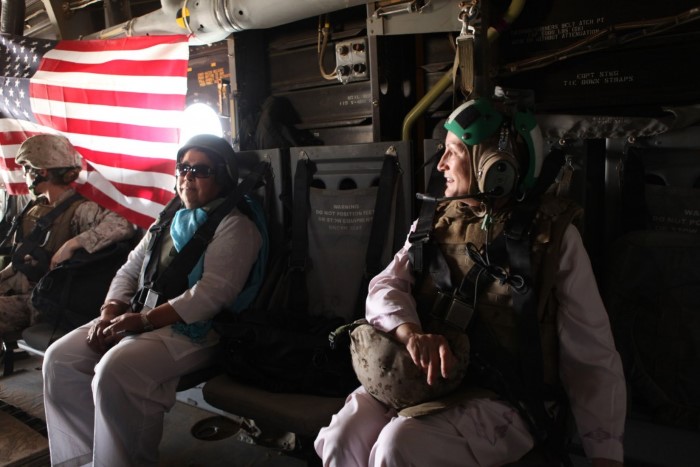
Connie Duckworth, founder of Arzu Studio Hope, and Razia Jan, founder of Razia’s Ray of Hope, take a ride on V-22 Osprey on their way to Lashkar Gah, June 2010. Duckworth and Jan visited Helmand province to survey potential sites to expand operations like the women’s center in Bamyan, Afghanistan.
What resources do you recommend?
For insight on the broad failure of foreign aid, I recommend the book Dead Aid: Why Aid Is Not Working and How There Is a Better Way for Africa by Dambisa Moyo.
For inspiration about innovation:
Design Thinking | Thoughts by Tim Brown
Design for the Other 90% |Cooper-Hewitt National Design Museum
To learn about social enterprise:
Skoll World Forum on Social Entrepreneurship
To learn about smart philanthropy:
The best website resource we have ever used is Different Development, a dynamic company in Hungary.
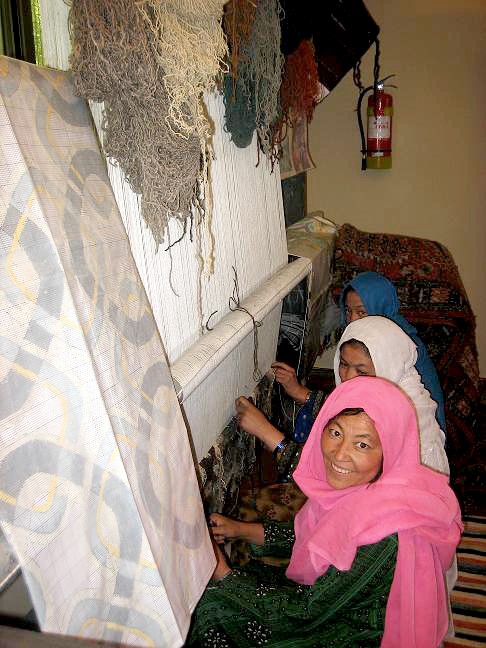
What’s next for you?
I am eagerly solving for the final missing piece in a very complicated puzzle—profitability. ARZU is a social business enterprise—a fairly broad approach to attack some of the world’s seemingly intractable social problems, like poverty. ARZU’s model is to become sustainably self-funding through rugs sales.
The key difference between ARZU and a for-profit company is that sales proceeds/profits stay within a closed system for the benefit of the weavers, their families, and their communities—rather than being returned to shareholders or owners in the form of dividends or Return on Investment. “Profits” are re-invested in furthering the social good through increased employment and social programs.
For all practical purposes, there is unlimited need in Afghanistan that goes unmet each and every day—whether for food, clothing, shelter, education, basic healthcare, and human rights—the list is endless. That is why the more “profitable” ARZU becomes, the more of these needs will be met.
Once we have achieved profitability, I will be ready to begin to think about what’s next for me.
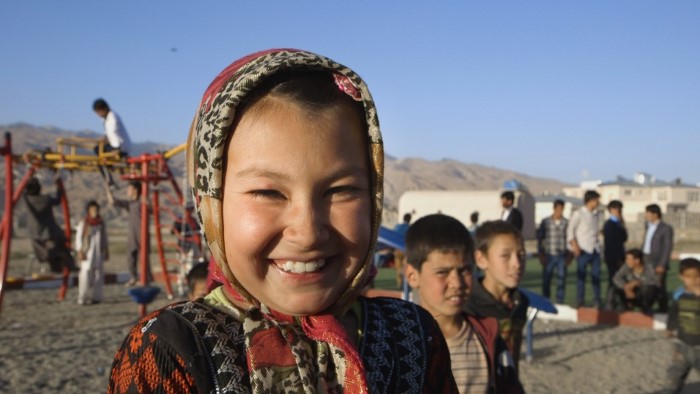
Connect with Connie K. Duckworth via info@arzustudiohope.org
To learn more about ARZU and to see our full collections, please visit arzustudiohope.org
For current inventory, custom projects, and pricing contact designservices@arzustudiohope.org or call Suzi Rizzo at 847-533-7534.
To see in-stock rugs, visit Minasian Rug Company, 1244 Chicago Ave, Evanston, IL 60202 (847) 864-1010.
To donate online, click the DONATE NOW button on the ARZU homepage.
To send a check: ARZU Studio Hope, 3149 Dundee Rd #273, Northbrook, IL 60062.
Amazon will donate a portion of your sales directly to ARZU. Here’s how to make your Amazon purchases count: Go to Amazonsmiles.com, enter ARZU into the Search Box, then shop!
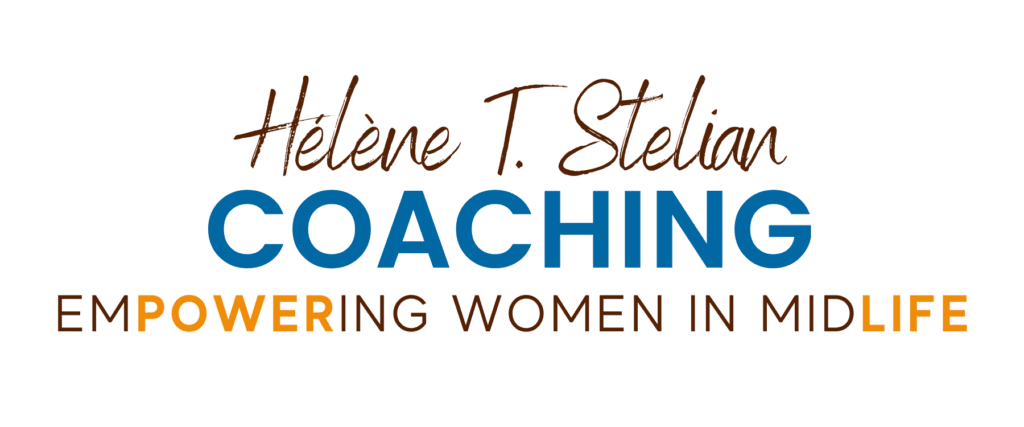
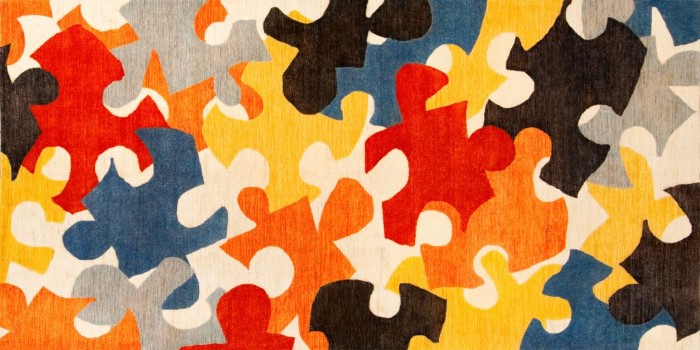
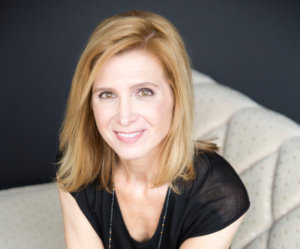




Connie is a great inspiration!